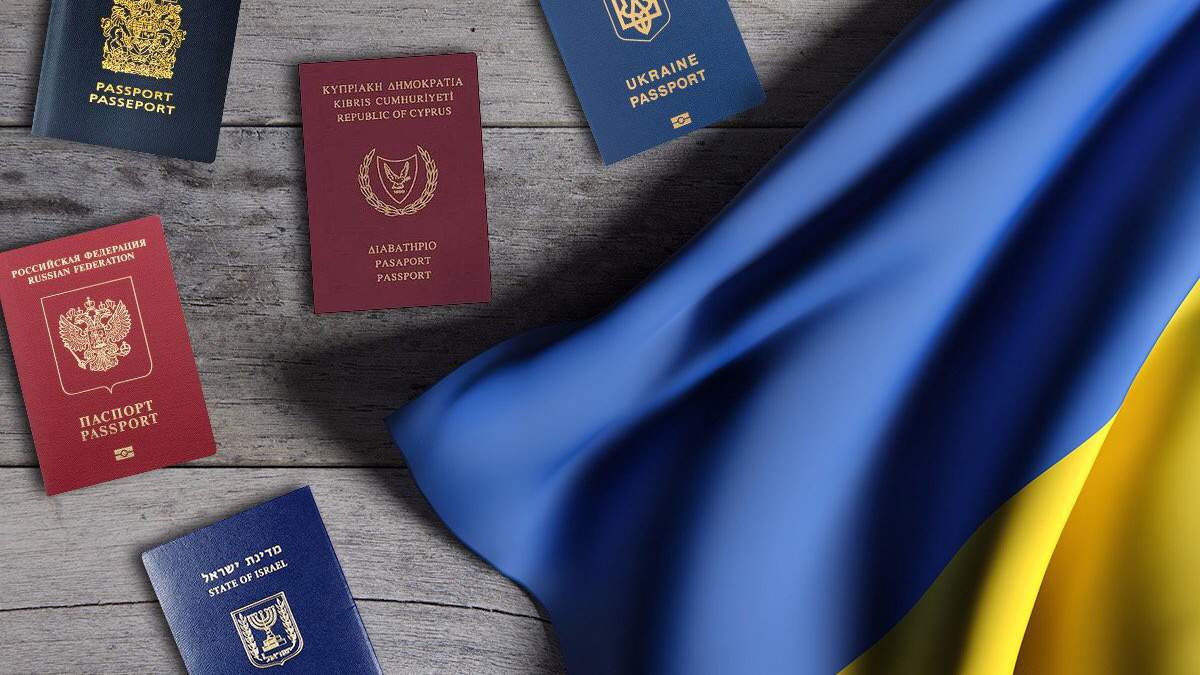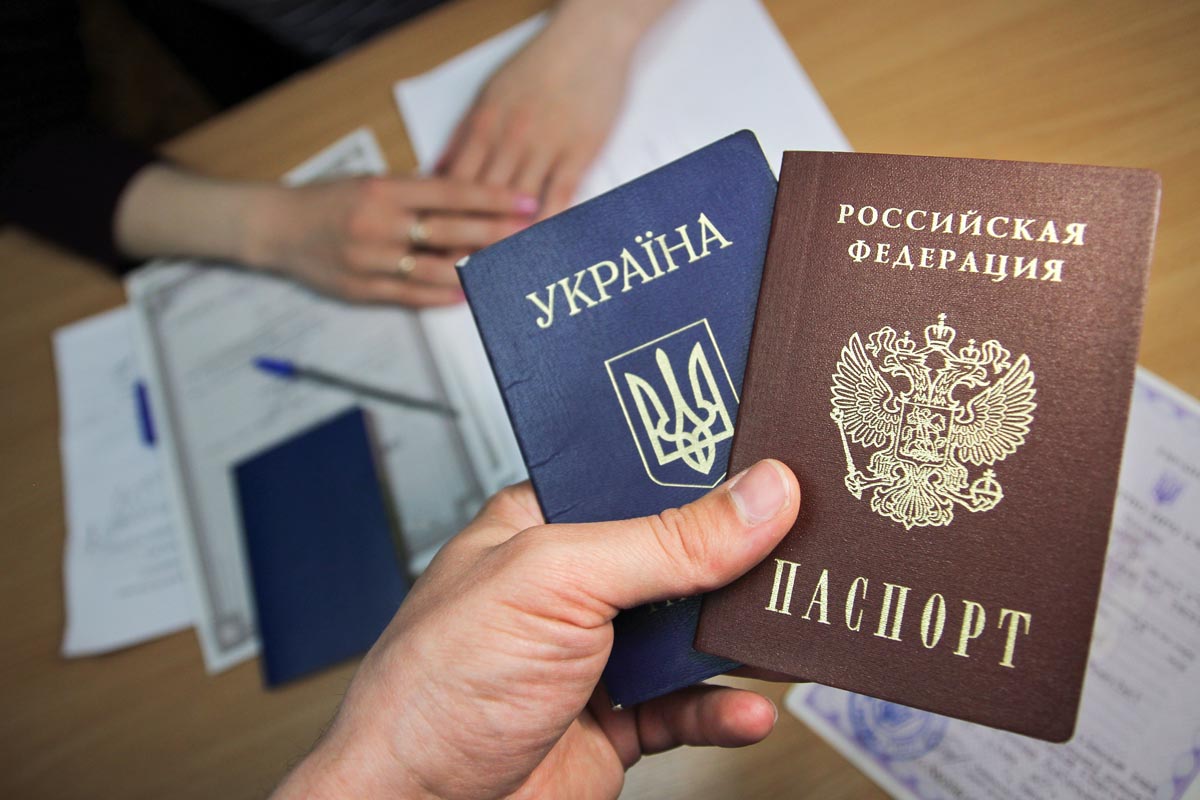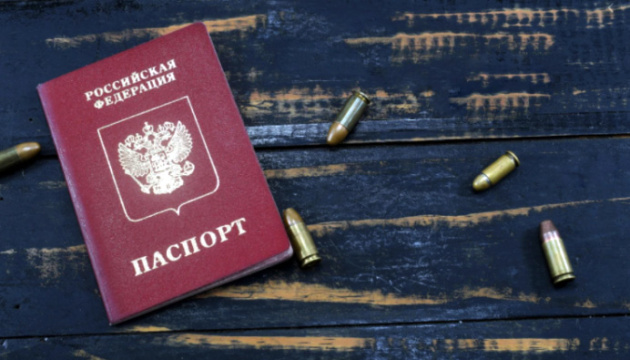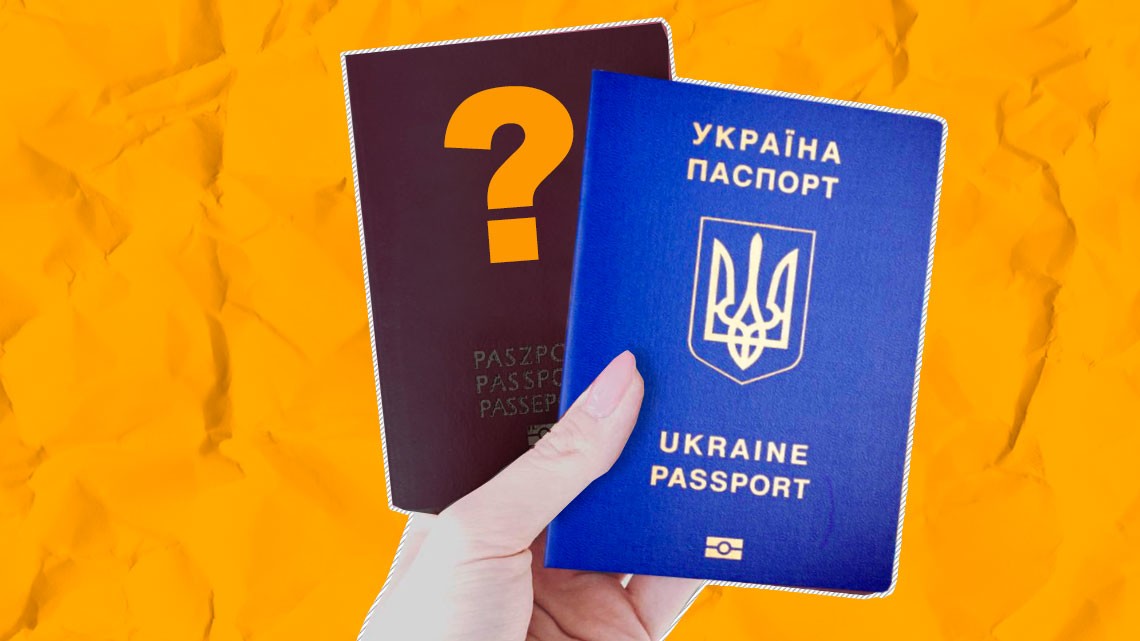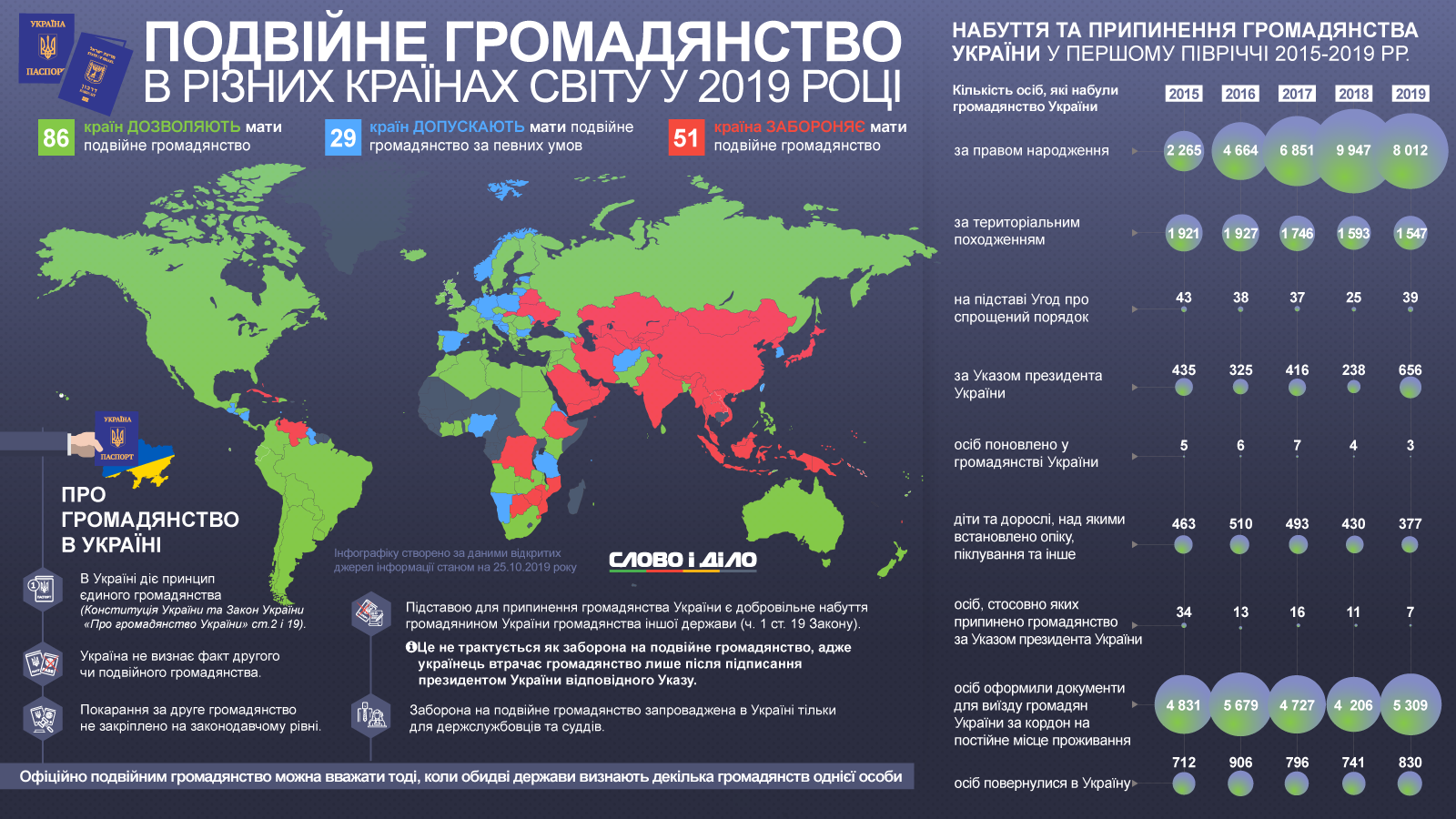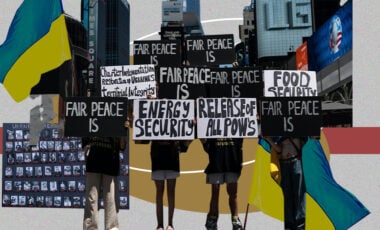Dual citizenship in Ukraine: advantages, threats, and pitfalls
Rubryka looked at what problems may arise in the way of enabling dual citizenship in Ukraine and how to solve them.
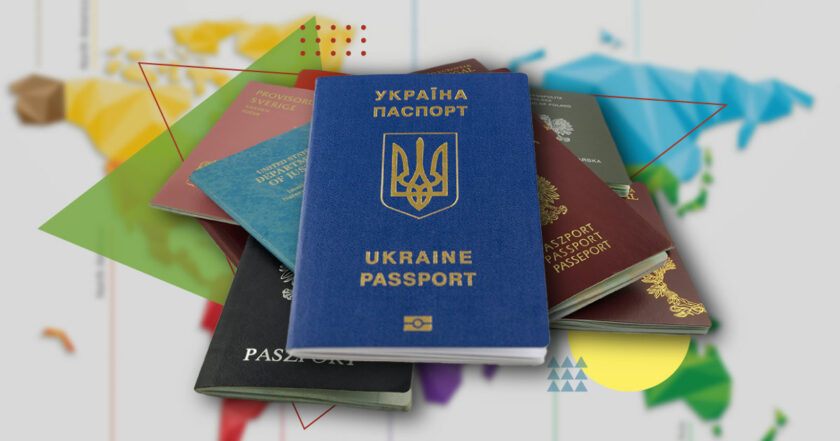
Rubryka
President Zelenskyy spoke again about dual citizenship for Ukrainians. He did so during a meeting with Americans of Ukrainian descent as part of his visit to the 76th session of the UN General Assembly.
"We must implement the idea of dual citizenship, especially for Ukrainians in America," the president said at the time.
And why "again"? Because he promised to allow dual citizenship during his inaugural speech in May 2019.
"There are 65 million of us. Those who were born on Ukrainian soil. Ukrainians in Europe and Asia, in North and South America, in Australia and Africa. I appeal to all Ukrainians on the planet: we need you. I'll be happy to grant Ukrainian citizenship to everyone ready to build a new, strong, and successful Ukraine. You should go to Ukraine not to visit but come home. We're waiting for you," the president said.
But the year 2021 is coming to an end, and dual citizenship is still banned in our country.
And there are reasons for that. After all, the situation where Ukraine is now forced into because of Russia somehow forces the authorities at all levels to look back at the Kremlin: to prevent it from using such positive solutions for Ukraine's development as the same permission for dual citizenship against Ukraine. Everyone remembers the statements of the highest officials in Moscow that Ukrainians and Russians are one people? And now imagine what the Kremlin will do when a certain percentage (say, one who vehemently denies the Ukrainian language) receives Russian passports.
And then there's Hungary, which will gladly start handing out its passports to Zakarpattia residents openly, not in hiding.
And now the president is launching a new round of discussions on this issue. After all, the disadvantages are disadvantages, but the advantages are also there. And not small. More details are in the Rubryka article.
Why do we need dual citizenship?
First, it will allow diasporas to become Ukrainians again. Therefore, it will encourage them to invest in our country and allow them to take an active part in its life.
"Dual citizenship is almost the key to solving the problem of building a global Ukrainian community, a society that will work anywhere in the world for the development of Ukraine. Thanks to this, we'll finally stop dividing our society into 'real Ukrainians' and the diaspora," Pavlo Klimkin, Minister of Foreign Affairs in 2014-2019, said in a comment to Rubryka.
He emphasizes that there are thousands of people in the world who "are ready to work for our country for Ukrainian citizenship": "I know such people; they live in the United States, Canada, Australia, and many European countries."
However, the benefits of permission to acquire dual citizenship don't end with the diaspora.
Zelenskyy's words about "65 million of us" should be taken in the context not only of the people who left Ukraine during the first waves of emigration but also of those who've left the country in the last 30 years since independence. And, according to the latest data, there are about 10 million. And a significant part of them includes migrant workers. Allowing them to have two citizenships at the same time wouldn't only make it possible to attract additional investments to the country, but also, according to political scientist Oleh Sahakian, who told PRM.UA, would prevent the "brain drain from Ukraine, and would allow us not to lose touch with them."
In addition, dual citizenship has several "grounded" but quite practical benefits. In his article for PG, Andrii Boiko, CEO and founder of the GARANT Emigration Center notes that besides simplifying traveling the world and providing "a spare location to move quickly in the event of an unstable situation in your country," dual citizenship provides opportunities for:
- Employment and training where the country concerned has agreements;
- Choosing the citizenship of children;
- Using social guarantees of both states;
- Expanding the geography of your business;
- Investing.
Yes, but…
Like a Ukrainian one, citizenship of any other country, along with rights, imposes certain obligations. One of these is the likelihood of conscription in both countries. In addition, some countries don't allow persons with a second nationality to hold high government positions.
Dual citizenship may also oblige a person to pay taxes to both "homelands." Such a rule exists, say, in the United States, which requires its citizens to pay taxes on income earned anywhere in the world.
In the context of Ukraine, it's worth talking not only about the shortcomings but also about the obvious threats to its security, which it carries in the permit for dual citizenship. It is, of course, about Russia's aggressive policy.
It's obvious that immediately after the official permission for 2 passports, the Kremlin will launch a broad campaign to grant Ukrainians its citizenship. And this, in turn, will allow Moscow to declare the need to "protect" the rights not of Russian-speaking people in Ukraine, but full-fledged citizens of the Russian Federation. It will increase its military activity against Ukraine, and most importantly, will erase all hopes for a solution to the conflict, even in the medium term.
And the fact that such a scenario is absolutely real and that the Kremlin is looking for ways to implement it is evidenced by Moscow's recent statement that it wants to significantly simplify obtaining Russian passports for all Ukrainians who wish to do so. Shortly, Russia intends to simplify the granting of citizenship to Ukrainians as much as possible, abolishing the necessary condition for obtaining a Russian passport, passing an interview for recognition as a native speaker of the Russian language.
The situation described above, with Hungary distributing passports to residents of the Zakarpattia region, is no less threatening. After all, this can allow it to directly influence the policy of Ukraine and interfere in the internal affairs of our country, creating an alternative reality for its residents with the help of a potentially controlled region of the neighboring state. Unfortunately, Ukraine already knows well what it could lead to.
However, there's a way out. And according to Pavlo Klimkin, it is very simple: to clearly define the acquisition of dual citizenship with which countries is allowed, and with which countries, it's strictly prohibited.
"Nobody is preventing us from passing a law on dual citizenship and listing the countries allowed for this. However, we must say clearly: there can be no dual citizenship with Russia. Finally, to introduce penalties for dual citizenship with the aggressor country, otherwise, Putin will distribute his passports and it will be the basis for Russia's progression to Ukraine," Klimkin said.
As for Hungary, "as well as our other very difficult neighbors from the EU, Romania, and Poland", the issue of dual citizenship, according to Klimkin, should be resolved "only during Ukraine's accession to the EU and NATO": "Otherwise, they impose such conditions on us, that we'll hold onto our heads for a very long time."
What about Ukrainians from ORDLO who already have Russian passports
Another difficult issue that Ukraine will inevitably face when granting dual citizenship is the presence of a Russian passport for many Ukrainians living in the occupied territories.
The threat is obvious: among those who are de facto in both Ukrainian and Russian citizenship, there are many so-called "Russian missionaries" who'll have the right to integrate into the socio-political field of Ukraine, becoming direct agents of the Kremlin's influence on Ukraine.
No less a problem, according to Klimkin, is the reluctance of the Ukrainian authorities to address this issue: "Instead of identifying people with Russian passports in the ORDLO, we need to understand who they are and how they affect our security, instead of developing measures to prevent further certification of these territories. We simply keep it quiet."
In addition, the fact that numerous Ukrainians in the occupied territories who've acquired Russian citizenship did so under duress and for their survival, is difficult.
Klimkin sees the solution in allowing ORDLO residents to be both Ukrainian and Russian citizens. However, under one condition, only the de-occupation of these territories. After that, the ban on simultaneous possession of Ukrainian and Russian passports should apply to all of them without exception.
Draft laws on dual citizenship
Currently, the Verkhovna Rada has 2 draft laws on introducing dual citizenship. The first is №2590, authored by President Zelenskyy. The second, №4640, was developed by the "Servant of the People" party member, Oleh Dunda.
An important feature of the presidential draft law is that it doesn't contain direct references to multiple/dual citizenship. However, the norm about the voluntary acquisition of a passport of another state by an adult citizen of Ukraine has been removed from the list of grounds for depriving Ukrainian citizenship.
In addition, the document, among other things, proposes to introduce the submission of a declaration of renunciation of foreign citizenship for the acquisition of Ukrainian citizenship, instead of the obligation to withdraw from the first one. Thus, the president proposes to allow persons acquiring Ukrainian citizenship to have a passport of another country at the same time.
However, this right will not apply to everyone. Zelenskyy's draft provides for the government to compile a list of countries with which dual citizenship will be possible, and prohibits it for citizens of the aggressor or occupying country.
Also, in the case of this draft law being adopted in the form submitted by the President, citizenship of Ukraine will be available to persons whose great-grandfather and great-grandmother lived in Ukraine until August 24, 1991. This norm expands the circle of potential Ukrainian citizens because according to the current legislation, such a right belongs to those who had only grandparents living on its territory before Ukraine gained independence.
At the same time, for foreigners who took part in repelling Russian military aggression in the ranks of the Armed Forces; those who've been persecuted in Russia, as well as children previously adopted by foreigners, the document intends to simplify the process of obtaining Ukrainian citizenship.
At the same time, the draft law enshrines a ban on persons with dual citizenship to hold several public positions. These are:
- Secretary or Deputy National Security and Defense Council;
- The head of the local state administration and his first deputies;
- Chairperson and Deputy Chairperson of the NBU, Member of the NBU Council;
- Chairperson and member of commissions for the regulation of natural monopolies;
- Positions in the National Commission on Securities and Stock Market.
However, it's probably not worth hoping for the adoption of the presidential draft law in its form. After all, the Main Scientific and Expert Department of the Verkhovna Rada has identified several problematic areas, the main of which is that the document doesn't provide for amendments to the Constitution, which directly contradicts the basic law. And this, according to parliamentary experts, may give the EU grounds to abolish the visa-free regime with Ukraine, because in the case of the adoption of this draft law will change the conditions under which this regime was granted.
Dunda's draft law not only expands the list of positions that are prohibited for persons with multiple/dual citizenship but also deprives the aggressor state of the right to vote and be elected in elections.
In addition, the document, among other things, provides for introducing criminal liability in the form of imprisonment for up to 5 years for persons who violated the requirements of declaring the presence or acquisition/termination of foreign citizenship.
However, Dunda's draft law has also been criticized by parliamentary experts. They note that, like the presidential one, this document provides for the introduction of the dual/multiple citizenships of Ukraine in circumvention of the norms established by the Constitution.
Dual citizenship in the world
The practice of dual/multiple citizenships is widespread in the world. For example, in Europe, its presence is allowed in several countries, but in some, it's under certain conditions.
For example, Hungary and Cyprus grant their citizenship as second in exchange for investment; the UK obliges the residents of its colonies and overseas territories to renounce their previous citizenship; Irish citizenship as a second can be obtained by descent.
In turn, Germany allows only citizens of the EU and Switzerland to obtain their citizenship and keep their "native." All others must first relinquish previous citizenship.
On the other hand, there are about 40 countries whose renunciation is impossible in principle. Among them are Iran and Argentina. For example, in 2019, all 190 Argentine citizens who received German citizenship retained their Argentine passports.
According to the laws of Iran, it's impossible to renounce not only its citizenship but also its acquisition: because a person born in any point of the world, whose father has an Iranian passport, automatically becomes a citizen of Iran.
In Israel, there's a rule according to which any Jew can obtain citizenship, regardless of the place of residence.
In the context of Ukraine, the example of Peru is illustrative. Only citizens of Spain and Latin America have the right to dual citizenship there.


